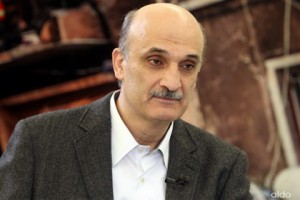 Lebanese Forces leader Samir Geagea offered his readiness to explore any amendment proposed to the hybrid electoral law that most March 14 parties have put forth as an alternative to the Orthodox electoral law proposal.
Lebanese Forces leader Samir Geagea offered his readiness to explore any amendment proposed to the hybrid electoral law that most March 14 parties have put forth as an alternative to the Orthodox electoral law proposal.
“ We have no problem with requests for an amendment of a specific article of the electoral draft ,” Geagea said on Wednesday during a press conference.
“Our priority is to reach a consensual electoral law based on the hybrid electoral draft proposed by Speaker Nabih Berri,” the LF chief added.
He went on to note that “the road to reaching a deal on the hybrid electoral law has been very rough” given that negotiations on this issue “were not easy.”
“During the past two weeks, we were interacting with [Future Movement leader] Saad Hariri as foes,” Geagea added.
He also expressed the importance of “turning the draft law we have proposed into an [actual] law.”
LF bloc MP George Adwan announced the formulation of a mixed electoral law that was agreed to by most of the March 14 parties before the parliament’s scheduled meeting on Wednesday. However, this proposal was rejected by March 14’s Phalange party.
Geagea later explained why he chose to not go through with the sectarian-based Orthodox electoral draft despite having previously endorsed it, saying that “The Orthodox law had no real chance of passing.”
The opposition leader backed his claim by saying that the Christian leaders who met in April at the seat of the Maronite Patriarchate in Bkirki realized that this draft will fail to be ratified, which was what prompted them to withdraw their support for it.
The main Christian political parties in Lebanon expressed their refusal to accept the 1960 electoral law at the April meeting, as well as their openness to an alternative to the Orthodox proposal, which calls for proportional voting along sectarian lines.
Geagea called on the FPM officials to “act sensibly,” and stressed that what has been reached was the result of “the efforts made by everyone, including the FPM.”
Free Patriotic Movement leader MP Michel Aoun was angered by the agreement reached between The Lebanese Forces party and its March 14 ally the Future Movement and criticized on Wednesday the political parties’ failure to approve the Orthodox Gathering electoral law during a parliament session.
Aoun said at the parliament : “Some of the parties that backed the proposal abandoned it therefore toppling the most important law for Christians,” adding: “The same concessions that were made during the approval of the Taif Accord are being repeated today.”
“We were waiting on this historic day for a fair electoral law to be approved,” he stated.
Aoun accused the Christian parties that did not back the Orthodox Gathering draft law of violating the principle of coexistence in Lebanon.
“We are concerned with offering fair representation for Christians, while the others only care about gaining more seats in parliament,” said Aoun.
Addressing Aoun’s accusations that the LF had broken its pledge over the Orthodox Gathering law, Geagea said: “We never made a pledge in the first place.”
He urged the FPM leader to halt his accusatory tone and heated rhetoric over this issue.
Geagea noted : “Why is it that parliament did not convene since the adoption of the Orthodox Gathering law on February 19? It is because some sides that claim to support it actually don’t.”
“I hope that Aoun would read the new hybrid law proposal and I think he will reach a different conclusion about it than the one he already made,” Geagea stressed.
The hybrid proposal calls for 54% of the MPs to be elected under the winner-takes-all majoritarian system and 46 % to be elected under the proportional representation system.
Speaker Nabih Berri had called on parliament to convene from May 15 to May 18 in an effort to develop a new electoral law, but included the controversial Orthodox law as sole item on the parliament’s meeting agenda for May 15.
However, after the LF, Future Movement, Progressive Socialist Party and independent Christian MPs unveiled their new proposal, Berri postponed the session to Friday.
If the parliament fails to agree on a new electoral law by a May 19 deadline, the 1960 law that governed the 2009 parliamentary vote would go into effect for the upcoming elections scheduled for June 16, according to caretaker Interior minister Marwan Charbel.

Leave a Reply
You must be logged in to post a comment.